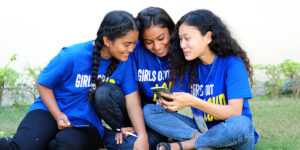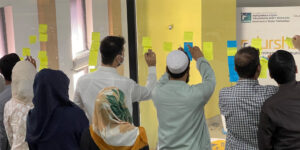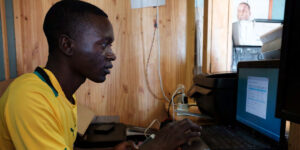Discover and learn from the Solidarity Playbook on cybersecurity
Strengthening cybersecurity
With increased digitalisation (international) civil society organisations – (I)CSOs – have faced an increase in digital threats and cyberattacks carried out by malicious actors interested in financial gains...
Learn MoreExplore the Centre’s ‘Civil Society Innovation and Digital Power Shift’ report

Civil society organisations are innovators. They test new approaches to both traditional and emerging problems. Rapid digitalisation is one of today’s most prominent and influential global drivers of change, but decisions on how future digital development and data use proceeds still sit almost exclusively with the governments and businesses already powerful and privileged enough to influence and receive its benefits today, further growing the equity gap to the half of humanity who remain unconnected.
While civil society organisations have achieved some success in shifting power around these challenges, there is a significant opportunity for organisations to learn and benefit from the lessons others have encountered.
The report will share effective and inclusive innovation approaches, solutions and new ways of working which are helping to shift power in the digital ecosystem, and achieve more people-centred or nature-positive outcomes enabled by digital technology, by showcasing eight case studies from international and national CSOs around the world. Get inspired by real-life examples of new approaches.
Plan International – Equality Tech

Code for Pakistan – Fellowship Program

Internet Society and Murambinda Works Community Networks

Listen to our Futures and Innovation Podcast – an audio series streaming on Spotify, Apple Podcasts and Soundcloud – and hear the stories of their inclusive innovation approaches to advance people-centred digitalisation, to either address system power imbalances or capitalise on emerging people power and technological capabilities.
Visit our Innovation Webpage to find out more about the aims of the report and all the case study content.
Data Lakes, Digital Equity, Governance, Innovation Report 2022Call for Applications: Evaluation Consultant
The Centre is looking for an experienced consultant or a team of consultants with expertise in Monitoring and Evaluation (M&E) to conduct an independent evaluation of the Leave No One Behind (LNOB) Partnership and its Making Voices Heard and Count project. The consultant will be expected to review and evaluate the activities the LNOB Partnership has conducted on global, national and local levels since its inception in 2017.
The Centre is commissioning a consultant to:
- Review various work documents and outputs of the LNOB partnership from 2017 through 2022 to assess the partnership’s overall work and achievements.
- Based on the review of relevant documents and outputs, sketch the overall scope of the evaluation, analysis framework and methodology.
- Draft evaluation questions, design the methodology and develop the assessment and research tools, including surveys and interviews.
- Conduct surveys or interviews with representatives from LNOB secretariat, country coalitions and other partners to support the evaluation.
- Review the 2022 baseline impact assessment results from LNOB country coalitions and their partners.
- Present results/findings and suggest recommendations for future programming and scaling up of the partnership, providing specifics for acting upon these recommendations, in a detailed 20-25 pages evaluation report.
Find the full tender and how to apply here
The Centre invites qualified individuals, pairs or small teams to submit a proposal for the requested services. The application needs to be submitted by 18 July 2022.
If you meet the selection criteria, please send an email with your CV and a short proposal including a proposed timeline and detailed budget, including daily rate in Euros (EUR) to Chandani Lopez. The proposal must be in English and preferably in PDF format. The subject of the application should read ‘Evaluation Consultant LNOB Partnership.’ Only shortlisted candidates who meet the criteria will be invited for interviews.
Call for Applications: Strategic Research Consultant
The Centre is looking for a strategic research consultant to conduct a mapping and support event content preparations during the initial phase of its new initiative “Anticipating Futures for Civil Society Operating Space”. The initiative’s overall aim is to strengthen anticipatory capacities and future readiness of civic space-focused professionals in international and national civil society organisations.
The Centre is commissioning a consultant to:
- Draw out the potential connections between how governments frame and respond to crises, including complex, uncertain future events like climate disruptions, and the implications for civil society action and operating space.
- Explore how states have pivoted to security framings in crises, the impact this has had on civic space and operating conditions, and the signals CSOs should increasingly become aware of.
- Explore emergent opportunities for civil society from previous crises – such as COVID-19 – which served to change or influence state perceptions, narratives and framings of civil society.
- Outline previous and current work in the field on “civic space futures” (e.g. International Center for Not-for-Profit Law’s (ICNL) Civic Space 2040 initiative of 2020).
- Identify gaps that require collective sector approaches and initiatives.
- Prepare the results of this mapping in writing (report of ca. 15 pages) or as a visualisation/map.
Find the full tender and how to apply here
The Centre invites qualified individuals, pairs or small teams to submit a proposal for the requested services. The application needs to be submitted by 15 July 2022.
If you meet the selection criteria, please submit your application to Eva Gondorová and Miriam Niehaus including:
- Cover letter (no more than 3 pages), including:
- A brief description of your experience and expertise in the field that illustrates your overall qualifications and capabilities for this scope of work, including two examples of your previous comparable work;
- A brief description of your understanding of the scope of services and proposed methodology for the work;
- Your consultancy rate (amount in EUR/day) and amount of working days.
2. Your CV.
3. Two references that can be contacted should you be shortlisted.




